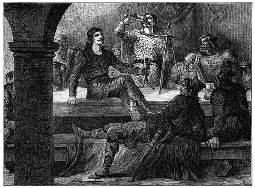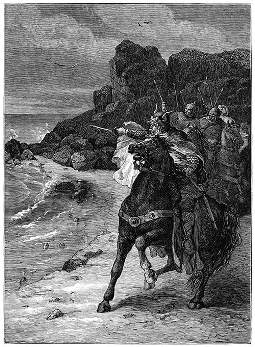An Adventurer’s Guide to the Middle Ages: What if There’s No Room at the Inn (or No Inn Whatsoever?)

So, by definition, adventurers travel. Where do you stay?
With the elves is good.
Seriously, Tolkien got it right. His two parties of adventurers travel across Middle Earth (which has an empty Early Dark Age/Early Middle Ages feel) and how many times do they stay in inns?
It’s pretty much camping and hospitality all the way. In Middle Earth, this means craving the hospitality of elves, shape-shifters, and humans of various social ranks.
In the real Middle Ages, you’re stuck with just humans.
Why There Aren’t Many Inns in the Early Middle Ages
Through much of the countryside of much of the Early Middle Ages (the modern term for Dark Ages — roughly Fall of Rome through to 1066 — though I am hoping that my Historiographically Challenged Period will catch on), there aren’t any inns. There are simply too few travellers to make it financially viable except in the big trade centres.
Worse, in most of the Early Middle Ages, most of the people probably aren’t paying for things with money anyway.

Sure, there is money around. It’s a unit of account for fines and taxes, but these are usually paid in kind without anybody ever seeing a coin (some cultures use other units such as cattle or even handmaidens, neither of which necessarily change hands).
The problem with coins is that though you can buy things with them, you can rarely do it right now. The lord wants his tax in cattle — or perhaps cheese — because he wants to feed his household this week. If you gave him cash instead, he would have a supply problem.
Though most of the surplus production goes to the overlord as tax, some goes to seasonal fairs to be bartered and — possibly — sold for cash. However, even your smallest small change probably represents a small fortune. Money simply isn’t granular enough to pay for bed and breakfast.
And don’t picture the local economy running off formal barter (like they tell you about in school — I’ll swap you a chicken for a fish hook). Instead people probably have ongoing reciprocal relationships — I gave you some eggs last week, next month you give me some fish-hooks you made. We both keep track over the long term, a bit like the way you do with Christmas presents between relatives. (Actually, in most Medieval peasant communities it’s a good bet everybody is a relative.)
So though some money might be useful, most of the significant payments are in kind.
Why You Need Hospitality
If you are lucky, you can stay in a monastery, which has a religious obligation to accommodate travelers in its guest house (for an appropriate donation based on your class). There will be downsides. They won’t make a good base of operations — they’re not set up for long term accommodation — and they won’t take it kindly when the barbarian — all parties have them! — gets drunk and starts a fight. The biggest drawback (from a gaming or fictioneering point of view) is that you won’t be embedded in the community meaning you’ll meet some interesting fellow travelers, but you won’t make the kind of local connections that result in adventure seeds.
If you are in the wilderness, then you can camp. However you usually need to do it near the road, or be “mistaken” for an outlaw. (Hint, the goods of slain outlaws are usually forfeit). And, if you camp near the road, then the real outlaws know where to find you.
Really, unless you are scarier than the outlaws — if you are, then the local lord may mistake you for invaders — then you need a roof over your head and a wall around your goods. And that, in the absence of a inns , or at least people who would accept cash for a bed and board, this means getting hospitality.
How to Get Hospitality

Somebody has to take you in. In most cultures, all you have to do is ask politely (preferably ask somebody who isn’t starving, however) because there is an obligation to offer hospitality to travelers.
This is both simpler and more complex than you might expect because in becoming a guest you also become temporarily part of a household.
In such insecure times, it might seem amazing that people are prepared to take in a stranger at all!
However, nobody poor has much really worth stealing that isn’t also pointless or unwieldy — WTF? Our guest ran off with the spade! Where would you even sell it? — and because people of all classes tend to live without much privacy — your host will know if you make advances on his wife or daughters, and — if he’s a lord — whether you are casing his treasure chest or coveting his mail shirt.
This is true whether you stay with a peasant farmer, in the equivalent of a small barn which his family probably shares with the animals, or with a local lord, in the equivalent of a large barn his household probably shares with his (watchful) dogs and (even more watchful) servants.
Also, since travelers are rare — that’s one reason why there’s no local cash economy — you are automatically interesting.
Your host can sharpen his prestige (and, by the way, show everybody how significant he is) by entertaining you. You have stories to tell that people will repeat for years to come, and you bear with you exotic trinkets. Sure, you’re a former Varangian Guardsman, not merchant. However, I bet you have some nice glass beads from Constantinople that would look good on your host’s daughter’s wedding gown. They’d make a lovely gift.
And talk of gifts brings us to the complexities.
Accepting Hospitality Means Being a Guest
When you accept hospitality, you are a guest, not a customer, and you need to behave like one.
You also need to come up with appropriate gifts or services to offset the cost of feeding you, and you need to do any negotiating without insulting your host by being too obvious. Communication will be by hint. You want to stay another week? Mention that you plan to go after that wild boar that’s been wrecking the crops. You’re host thinks you are free-loading? He might start moaning about that leaky roof and mentioning that he’s heard barbarians are expert carpenters.
Because you’re a guest, and he’s a host, that’s the language you use. However, your host’s motives may be entirely mercenary (if he’s the local lord, then he may want to use you as actual mercenaries) and if he feels exploited or turns greedy, you are in a very weak position; You are a stranger with no kin to protect you or to demand compensation if you are killed, or to rescue you if you are enslaved. Local justice is pretty much formalized self help with a side order of mob rule. It’s generally OK to kill outlaws and thieves caught red handed. (I’ll let you join the dots.)
Hospitality Means Being Part of the Household

If you cause trouble, get into a fight, kill somebody, then he is responsible. Usually this responsibility is formal and he will end up paying any fines or compensation that you can’t cover…. or that your goods can’t cover. (Remember what I said about local justice and about everybody being related. Yes, we all know Uncle Bob cheats at gambling games. However he’s still Uncle Bob. You can’t just stick a knife in him and expect to survive.)
Your host will also get stuck with any feud you kick off, especially if he is a nobleman. Suppose you stay with one lord on the way to rescuing a prisoner from another lord? Your host doesn’t want his family to spend the next three generations fighting that of his neighbor (who is also his third cousin’s brother-in-law, by the way). He’ll most likely send the prisoner — and your heads — back with apologies.
This works both ways.
Your self image and honor demands you feel some obligation to your host, and if there’s a fight, you’ll stand shoulder to shoulder with him (which the enemy will expect anyway, so there’s not much point in doing a runner). This holds true whether defending a lord’s stockade from raiders or a peasant’s hovel from outlaws.
Hospitality — It’s Complicated
 So, when travelling in Early Middle Ages, in the absence of a cash economy and trade routes — if people don’t pay with things with coins or have reason to travel — then there’s probably no inn and nothing remotely like one.
So, when travelling in Early Middle Ages, in the absence of a cash economy and trade routes — if people don’t pay with things with coins or have reason to travel — then there’s probably no inn and nothing remotely like one.
Instead, you need to rely on your charm and novelty, and the hint of gifts, to persuade somebody to be your host. This puts you in a guest-host relationship requiring tact and courtesy. It also makes you part of his household, meaning you are both a resource and a liability. You and your hosts may become friends. However, he will also keep an eye on you.
Is this more complicated than expected?
It’s certainly more interesting than people might expect. Just reading this back, I can see the potential conflicts unfurl, feel stories itching to evolve.
Not just stories. With my GM hat on, I can imagine using hospitality to embroil my players in quirky local problems.
What about Fantasy world builders? If you want inns, you have to create an economy to support them. Conversely, travelers and a cash economy probably generate inns. Also, the absence of inns can also be interesting if you have a culture of hospitality.
M Harold Page is the sword-wielding author of books like Swords vs Tanks (Charles Stross: “Holy ****!”). For spinning tightly plotted tales in your lovingly crafted secondary world, try his Storyteller Tools: Outline from vision to finished novel without losing the magic (Ken MacLeod: “…very useful in getting from ideas etc to plot and story.” Hannu Rajaniemi: “…find myself to coming back to [this] book”.)
Most fantasy I see really seems to be taking place in the 18th century at the earliest, based on how people think and act. Which is of course a valid choice for a reader, but it’s even done when the world is described to look like the middle ages or the Iron Age. And that really is a shame. There are so many interesting things to do and happen in a medieval or prehistoric fantasy world, but it’s so very rarely done.
Yes. There’s also this issue that the society and culture of the Middle Ages reflects the tech available to them at the time. For example, even a single knight could turn a battle. That sort of insane prowess needs something different from Renaissance or Enlightenment culture to support it.
Well put, Martin.
I think this still holds true, in some places, in some ways.
Certainly, in my travels to people and places that are rarely visited and where the inhabitants struggle to afford travel, then we visitors are indeed exotics. We are the Windows on the wider world. The major entertainment to reach that hamlet that week, or even that year.
Regarding a angle knight turning a battle.
I think the modern equivalent has been a small group of scientists / engineers / managers turning a war.
We may not have a modern equivalents of Achilles and Hector, but we still have the modern equivalents of Weyland Smith, crafting weapons of might. Wee have always had the equivalent of Odysseus, devised of stratagems.
Well, maybe not changing the outcome of a battle. Another thing many fantasy writers tend to misjudge is that major battles were really big events at any time. A 100,000 people on the field was not too unusual.
But the outcome of a skirmish certainly.
@Martin Kallies
It depends on the era. William Marshal fought in perhaps 3-set piece battles in his entire life!
100K on the field at Chalons, perhaps, and in the ancient/classical world. Less so in the High and Later Middle Ages where you’d expect a tenth of that.
And knights did turn the course of battles, though leading from the front rather than single handedly I hasten to add. Good example at Siege of Rhodes where the breach fell until the Grand Master took a personal stand in it.
Great post, as usual, Mr. Page.
Valette helped staunch a breakthrough at the Siege of Malta by his sheer presence.
In regard to Early Medieval inns, the Brehon laws in Ireland required tuaths or the king to subsidise hostels. Such were the scene for a couple of interesting tales from the Ulster Cycle. The Viking period seems to have shut such hostels down, but Irish hospitality is still proverbial.
@deuce
Yes he did! But at Rhodes another Grand Master stepped into the breach with a handful of companions.
William Marshal led the assault on Lincoln in 12-whatever and personally took out the French commander. And so on. A knight is like a tank. Sometimes they punch tactically above their weight.
Subsidised hostels in Ireland? Fascinating. That gets around the whole money problem. Will investigate for my next one! THANKS!